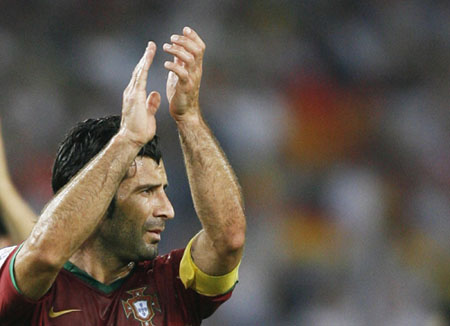As good as he was, Luis Figo could not equal Eusebio.
The longtime Portugal captain was unable to lead his country to third place
at the World Cup and match his legendary predecessor, possibly ending his
international career in a 3-1 loss to Germany on Saturday.

Portugal's Luis Figo
acknowledges the crowd after their World Cup 2006 third place soccer match
against Germany in Stuttgart July 8,
2006.[Reuters] |
The 33-year-old Figo says he won't play in another World Cup and is widely
expected to retire completely from international soccer after the tournament. He
was arguably Portugal's most consistent _ and exhausted _ performer in Germany,
where he started all games up to Saturday's third-place match.
With the hope of at least equaling Eusebio, who led Portugal over the Soviet
Union in 1966 and a third-place finish in soccer's quadrennial championship,
Figo was the last of the country's so-called "golden generation" and now cedes
the mantle to a younger crop of players.
"It's hard to end our tournament like this," Figo said. "But the defeat
doesn't erase what Portugal has done in Germany."
A glimpse of what life after Figo will look like for Portugal came in
Stuttgart when the midfielder gave up his place in the starting lineup to
26-year-old Simao Sabrosa.
Without the steadying hand of Figo, who had scored 32 goals for Portugal, the
side lacked direction and gave perhaps its most colorless performance of the
competition.
When he entered as a substitute for his record 127th appearance in Portuguese
colors with 13 minutes left, the 52,000 crowd _ nearly every one of them German
_ stood and applauded him.
His impact was immediate. The Portuguese looked more dangerous going forward,
and when Figo received the ball on the right wing with two minutes remaining he
sent over a dipping cross for Nuno Gomes to score at the back post with a diving
header.
The few Portuguese fans rang out their usual chant of "Fi-go, Fi-go."
The game was Figo's last chance at international glory.
Portugal's best player of his generation won plenty of titles at some of
Europe's top clubs. He was also voted European Footballer of Year in 2000, and
the following year earned the highest accolade when he was elected FIFA's World
Player of the Year.
He mostly knew heartbreak at international level, though.
At the 2002 World Cup, Portugal was highly touted with its golden generation,
but was beaten by the United States and South Korea and didn't get out of the
group stage.
Two years later at home in the European Championship, Portugal rode a wave of
national euphoria all the way to the final, only to lose to surprising Greece.
Figo's contemporaries, which also included midfielder Rui Costa, broke up
without winning any silverware.
The setbacks prompted Figo to withdraw from international soccer in late
2004.
He returned, however, and helped Portugal through a 12-match unbeaten World
Cup qualifying campaign.
Despite his age, he was a role model on and off the pitch for less
experienced members of the squad in Germany. In the opening-game win over
Angola, he was selected as man of the match.
He helped steer Portugal on a five-game unbeaten streak up to the semifinals
where it lost to France.